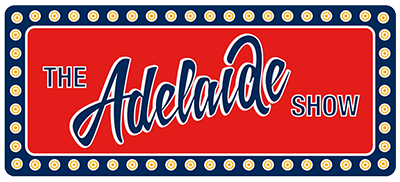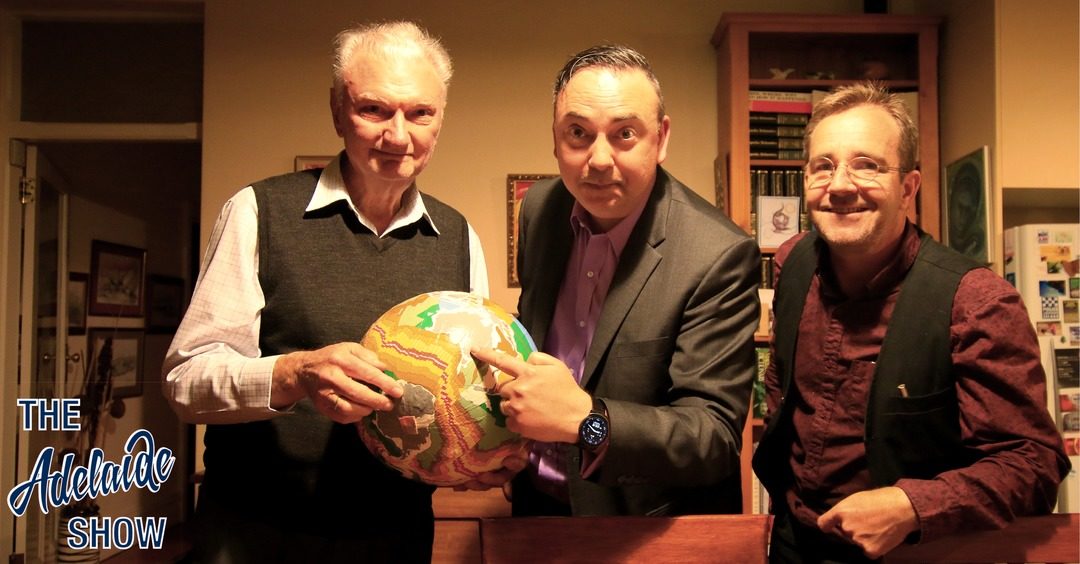This week, we chat with Associate Professor Vic Gostin on time, rocks, and space. Victor is from the University of Adelaide’s Earth Sciences department and is our first guest to have an asteroid named after them, Asteroid 3640 Gostin 1985 TR3.
This week, the SA Drink Of The Week is from Skillogalee.
In 100 Weeks Ago we hear a snippet from Melanie Usher.
We also discuss fundraising for research.
And in the musical pilgrimage … we hear a track from former Redgum band member, Verity Sanders, about the AFLW.
Meet Assoc #Professor @VictorGostin from @UniofAdelaide talking #geology #SouthAustralia & #meterorites on The #Adelaide Show 220 in orbit of your #podcast player NOW. Oh, and hear a new song about @aflwomens #footy #AFL https://t.co/IDjcpLcRlX
— The Adelaide Show (@TheAdelaideShow) November 8, 2017
And please consider becoming part of our podcast by joining our Inner Circle. It’s an email list. Join it and you might get an email on a Sunday or Monday seeking question ideas, guest ideas and requests for other bits of feedback about YOUR podcast, The Adelaide Show. Email us directly and we’ll add you to the list: [email protected]
If you enjoy the show, please leave us a 5-star review in iTunes or other podcast sites, or buy some great merch from our Red Bubble store – The Adelaide Show Shop. We’d greatly appreciate it.
Running Sheet: Assoc Professor Vic Gostin on time, rocks, and space
| TIME | SEGMENT |
| 00:00:00 | Outtake |
| You’re “rushing” | |
| 00:00:38 |
Theme |
| Theme and Introduction. Our original theme song in full is here, Adelaidey-hoo. | |
| 00:02:57 | SA Drink Of The Week |
2015 Skillogalee Take Two Shiraz Cabernet Clare Valley … tasting notes.
|
|
| 00:11:45 | Stories Without Notice |
| Fund raising for research. Dan Drummond is raising funds through Movember for male depression, via https://au.movember.com/mospace/13599924, and Nigel’s family is raising funds for research into brain cancer via the walk 4 brain cancer, http://www.walk4braincancer.com.au/my-fundraising/5645/team-edna. Nigel and Vic, how important is funding these fundraisers. Does it actually help researchers? |
|
| 00:15:59 | Associate Professor Vic Gostin |
| In the wake of last week’s exploration of Arkaroola rocks, many of us have been left perplexed by how to understand the sheer scope of geological time in our human brains. This is why we have turned to Associate Professor Victor Gostin of the University of Adelaide’s Earth Sciences department. Vic has long held the belief that geology brings all the sciences together and, in particular, he argues that astronomy and geology have the concept of ‘deep time’ at their core and they help us gain a deep perspective on the world and its structure. We’re hoping to chip off some helpful insights from the mass of Vic’s intellect and experience tonight.
What has been your link to Arkaroola? Do you agree with the Sprigg stories, that Sir Douglas Mawson got involved in mining operations but was really just after access to unique minerals? Hot, sweaty, flies, steep; what are your earliest memories of going out on site in your geological pursuits? How can we wrap our minds around time, especially when staring at geological records? How is it that geology binds science together? How is astronomy linked to geology? Tell us about your discovery in the Flinders Ranges of a deposit of volcanic material that was ejected from Lake Acraman 300 km away due to the impact of a meteorite? And how does it relate to a claim on The Study that, the geology, and lately the palaeontology of your discovery, is stimulating some interesting new lines of research into the origin of multi-cellular life on earth? Can you explain our fixation on astrology? Especially when everything is moving? From Andrew Reimer: How can you prove the world is not flat? How can we soak up more “wonder” in our lives? Your wife, Olga, is an academic in her own right in anthropology. Are holidays with you two really nerdy or do you talk about mundane matters too? |
|
| 01:29:27 | Is It News? |
| Nigel Dobson-Keeffe challenges the panel to pick the fake story from three stories from South Australia’s past.
Observer March 1905 Register 1904 The Advertiser June 1951 |
|
| 01:39:10 | 100 Weeks Ago |
| In 100 Weeks Ago, we revisit Melanie Engelmann (Usher), star of breakfast radio, and talk about her pathway into the field by learning on the job. Something Vic Gostin explains IS possible in science. | |
| 01:44:33 | Musical Pilgrimage |
| And our song this week is The Women Have Come To Play by Verity Sanders, selected by our musical curator, Todd Fischer.
This week we are playing a song from Adelaide musical icon Verity Sanders.
Verity was a member of popular folk and political band Redgum, which was led by one our past guests John Schumann. Steve also tells me that Redgum were an inspiration for this podcast so it’s great to hear something new from Verity.
The song celebrates women in sport and is called “The Women Have Come To Play”.
|
|
| 01:53:03 | Outtake |
| NIgel’s found your sundial … Vic, have you used telescopes? | |
Here is this week’s preview video:
SFX: Throughout the podcast we use free sfx from freesfx.co.uk for the harp, the visa stamp, the silent movie music, the stylus, the radio signal sfx, the wine pouring and cork pulling sfx, and the swooshes around Siri.

